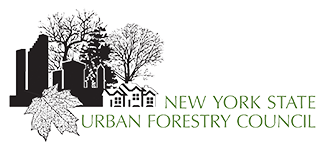
Volunteers of all ages made native plant seed balls for distribution across the five boroughs of NYC. All photos courtesy Student Conversation Association
On the 47th Annual Earth Day on April 22, 2017, New York Restoration Project (NYRP) and young people from the Student Conservation Association (SCA), in its 60th year, teamed up in Riverbank State Park in Manhattan to help “ConSERVE” New York City. Together they gave away 250 native trees—like tulip poplar, serviceberry, and black tupelo—to NYC residents. Seven hundred volunteers came out to give away trees, make native seed balls to be planted throughout the city, make recycled seed starters, conduct field research, and paint and assemble boards for park benches.
New York Restoration Project (NYRP) continues to partner with community organizations throughout the five boroughs to give away hundreds of free trees to New Yorkers during the spring and fall planting seasons. With the help of more than 100 community organizations, NYRP has given away tens of thousands of trees to be planted in New York City.
Along with NYRP, SCA was excited to have New York State Parks Commissioner Rose Harvey and SCA President and CEO Jaime Matyas to welcome volunteers to the event, along with a street team and DJ from Urban Radio 103.9 and live music from The Beacons. NYRP raffled off a worm bin compost system after giving a workshop, “Vermi-Compost at Home.”
NYRP Public Programs Manager Rosemarie Miner says that NYRP is about building partnerships with local community organizations who leverage their relationships in the community to promote the tree giveaway program across the many diverse neighborhoods of the City’s five boroughs.
“Our amazing partner organizations promote the mission of the program, host the event, and are invaluable stakeholders in the community,” Miner says. “Much like our urban trees, the organizations we partner with are unsung heroes, who do so much good without much recognition. Our tree giveaway program aims to highlight the importance of both in the local environment. Working with other environmental advocacy organizations, like the Student Conservation Association, we are able to combine our strengths to put together a really special event!”

SCA volunteers gently uncovered historic gravestones as part of a survey at Trinity Cemetery. Photo: SCA
At Trinity Cemetery, the only remaining active cemetery in Manhattan, the SCA has been working on a project to update a survey of historic memorial inscriptions and family plots that has not been updated since 1931. As part of this, volunteers on Earth Day reviewed historic maps to match up plot numbers, recorded memorial inscriptions that had been missed or transcribed incorrectly, took note of broken or damaged memorials in need of restoration, and gently uncovered overgrown memorials to reveal and record their inscriptions. Trinity Cemetery is the final resting place of esteemed conservationists such as John James Audubon. It provides 24 acres of beautiful public green space to upper Manhattan, making it a superb partner site for the Earth Day events along with Riverbank State Park, St. Nicholas Park, and Jackie Robinson Park.

Volunteers engaged kids in the “Decomposition Derby,” asking, for example, “Which lasts longest in a landfill: a wool sock, a tin can, or a glass bottle?” Photo Courtesy SCA
About the Student Conservation Association
The Student Conservation Association (SCA) is America’s largest and most effective youth conservation service organization. SCA conserves lands and transforms lives by empowering young people of all backgrounds to plan, act, and lead, while they protect and restore our natural and cultural resources. Founded in 1957, SCA’s mission is to build the next generation of conservation leaders, and 70% of its 85,000 alumni are employed or studying in conservation-related fields. For more, visit www.thesca.org.




